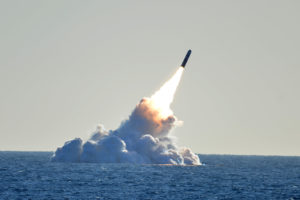A couple of weeks ago, we noted that the Senate Armed Services Committee was about to get its chance to consider the National Defense Authorization Act (NDAA), which in its current form includes $88 million in funding for a new, lower-yield warhead for the Trident D5 submarine-launched ballistic missile (SLBM), designated the W76-2. At the time, the House Armed Services Committee had voted, along party lines, to reject an amendment that would have eliminated funding for the new warhead.

An unarmed Trident II D5 missile launches from the Ohio-class ballistic missile submarine USS Nebraska, These missiles currently carry W76 and W88 warheads with yields of 100 kilotons and 455 kilotons, respectively. The proposed W76-2 warhead would reportedly have a yield in the range of 6.5 kilotons.
Plans for the new lower-yield warhead have drawn criticism from many quarters, including a number of prominent former officials and military leaders, who collectively sent a letter to Congress asking that it not fund the program. The letter, signed by former defense secretary William Perry, former secretary of state George Shultz, former vice chairman of the Joint Chiefs of Staff Gen. James Cartwright (Ret.), and former head of the National Defense University Lt. Gen. Robert Gard (Ret.), among others, calls the new warhead “dangerous, unjustified, and redundant.” The signers say that “the greatest concern…is that the president might feel less restrained about using [the new warhead] in a crisis.” They call on Congress to exercise its authority to reject the administration’s request for funding and thereby “stop the administration from starting down this slippery slope to nuclear war.”
Since our previous post, the full House passed its version of the NDAA on May 24th, in the process rejecting—in a surprisingly close and but mostly partisan vote—an amendment sponsored by Rep. John Garamendi (D-CA) and Rep. Earl Blumenauer (D-OR) that proposed fencing half of the funding for the low-yield warhead. This funding would have been held until the secretary of defense submitted a report to Congress assessing: the effect of the new warhead on strategic stability, ways to reduce the risk of miscalculation associated with it, and how to preserve the survivability of subs that would carry it, should it ever be launched. The House rejected it by a vote of 226 to 188, largely along party lines, with seven Democrats voting against the amendment and five Republicans voting for it.
The Senate version of the NDAA is expected to be released any time now, and could go to the floor as early as this week. One point of debate is likely to be over a House provision that eliminates a 2004 requirement that the Secretary of Energy must get Congressional approval before developing a new low-yield nuclear weapon.
Success, however, will require Republican support as well. The 2004 limitation on low-yield weapons was approved on a bipartisan basis. And in 2005 Congress did find bipartisan backing to reject a Bush administration proposal for a new bunker-busting nuclear bomb. Senators should take a lesson from these and other past decisions that looked beyond knee-jerk party allegiance. They should listen to the experts—from both parties—who argue based on their long involvement with these questions that low-yield nuclear weapons are both dangerous and unnecessary, and they should base their votes on what is best for the security of the country as a whole. That security does not require a new lower-yield Trident warhead; in fact, just the opposite: it requires that the Senate oppose it.
